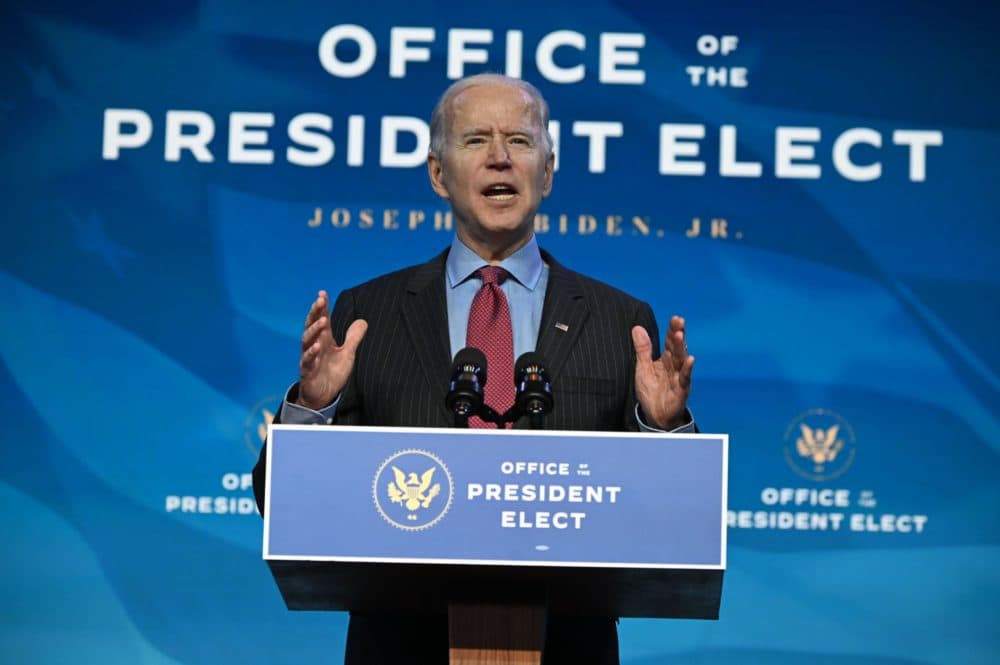Advertisement
Direct State Aid In Mass. Totals $4.55B In Biden Rescue Plan

With the U.S. House eyeing a vote on President Joe Biden's $1.9 trillion stimulus package next week, as much as $8.275 billion in direct aid to state and local government in Massachusetts could be on the line as Beacon Hill lawmakers begin the process of building the next state budget.
Biden's package includes $350 billion in support for state and local government, which Gov. Charlie Baker has described as "critical" to helping states like Massachusetts rebuild their economies as more of the public becomes vaccinated from COVID-19.
The funding would be in addition to other buckets of stimulus spending that would flow to schools, businesses, testing and vaccination programs, the unemployed and direct checks to families in Massachusetts.
Congress and former President Donald Trump excluded direct state aid from the most recent $900 billion federal stimulus bill, but governors have been pushing for more federal support for months. House Speaker Ron Mariano said over the weekend the federal stimulus could help lawmakers avoid cuts and replenish the state's reserves, all while avoiding tax hikes.
Massachusetts would receive $4.55 billion in state aid, under the White House plan, and cities and towns would be eligible for an additional $3.73 billion, according to figures shared with the News Service by U.S. Rep. Lori Trahan's office.
Trahan's office said it expects the Budget Committee to release the final text of the bill this week, and the U.S. House is tentatively looking at next week to hold a vote.
U.S. Rep. Richard Neal, who joined Baker at the State House last week to advocate for more federal funding, is working on another part of the relief package as chairman of Ways and Means that would provide direct checks of $1,400 to qualifying residents.
Mariano said over the weekend in an interview on WCVB's "On the Record" that he was watching to see what happens in Washington "with a high degree of intensity."
Advertisement
"Right now taxes are not on the table. We have no intention of raising taxes," Mariano said. "We have to sort of figure out where we are in our budget, how much we are going to be short. I'm not optimistic tax revenues are going to match. Even with some surprisingly robust returns, I'm still afraid we're going to be a little short."
Baker filed a $45.6 billion budget for the fiscal year that starts in July that relied on $1.6 billion in reserves. Despite the state collecting $764 million more in taxes from people and businesses through January than it did during the first seven months of the prior fiscal year, revenue officials don't expect the growth in revenue to continue at the same pace.
Baker's budget would leave the state's "rainy day" fund, which started the pandemic with about $3.5 billion, at an estimated $1.1 billion after fiscal 2022.
"If this $1.9 trillion package gets passed, I think we'll be able to be alright with having to doing anything more than reallocate our funds and maybe put some money back into the rainy day fund," Mariano said.
The federal government has sent about $68 billion in aid to Massachusetts since the pandemic began, but much of it has flowed directly to businesses, families, non-profits and public entities like regional transit authorities. The Paycheck Protection Program, for instance, delivered $38 billion for businesses impacted by the pandemic, according to state data, while nearly $930 million went schools and $18.4 billion was earmarked for unemployment assistance benefits.
The state received about $7 billion in funds over which it had some discretion, including $2.5 billion through the Coronavirus Relief Fund, according the Executive Office of Administration and Finance,
Through the end of 2020 state data shows the state has spent close to $1.4 billion so far and administration officials say all the money has been committed and none will be returned to the federal government at the end of the year when it is due to expire.
Of the $2.5 billion in the Coronavirus Relief Fund, the Baker administration made $502 million available to municipalities and has distributed $324 million. Cities and towns are eligible to request funding based on their population size to cover allowed pandemic-related expenses.
Nearly $100 million went to 258 municipalities in the first round administered by the state in May and June, and another $224 million was awarded to 267 cities and towns in October.
The application window for the third round of funding closes on Feb. 26.
The state has also leveraged Coronavirus Relief Fund aid to launch a $668 million state-run small business recovery program that is underway, and the Executive Office of Administration and Finance said Massachusetts has received nearly $750 million for testing and tracing since the pandemic began and over $510 million for vaccine support, $450 million in federal rental assistance and over $375 million for personal protective equipment, food and other priorities.